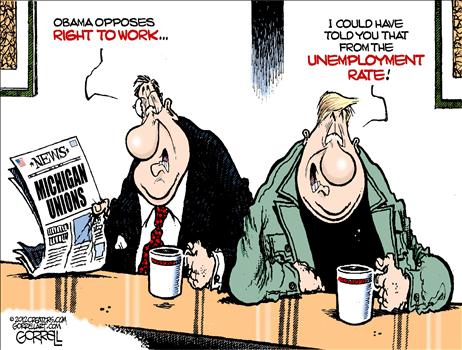I was very critical of the General Motors bailout since it largely was designed to give undeserved special benefits to the UAW union. I’m also very down of teacher unions because they sabotage reforms that would help poor children trapped in failed government schools.
And I’m definitely opposed to the excessive pay and benefits that politicians grant to bureaucrats in exchange for votes and money from government employee unions (as cleverly depicted in this great Michael Ramirez cartoon).
So why, then, do I have mixed feelings about the recently enacted right-to-work law in Michigan?
Here’s some of what I wrote almost 25 years ago for the Villanova Law Review, beginning with my general philosophy on the role of government in labor markets.
…government should not interfere with certain personal decisions, including the freedom of employers and employees to contract freely, unfettered by labor regulations. …My position is one of strict neutrality. The government should not take side in employer-employee issues. …this is a question of property rights. If another person owns a business, I do not have a right to interfere with his choices as to what he does with his property – so long as he does not interfere with my rights of life, liberty, and property.
That’s all fine and well. Standard libertarian boilerplate, one might even say, and I’ve certainly expressed these views on television (see here, here, and here).
But then I explore some implications. If you believe in a system based on property rights and private contracts, then right-to-work laws are an unjust form of intervention.
Recommended
…a property rights perspective also would reject so-called right-to-work laws which infringe upon the employers’ freedom of contract to hire only union members which is something employers may wish to do since it can lower transactions costs. …Some would argue that nobody should be forced to join a union as a condition of employment. The relevant issue in this instance, however, is not whether one can be forced to join a union, because a person cannot; if he does not like the union, he can refuse the job. The real issue is whether a business and its employees should have the freedom to choose to sign contracts which have union membership as a condition of employment.
All that being said, I’m glad Michigan just enacted a right-to-work law. I know it’s not ideal policy, but my rationale is that most government labor laws (such as the National Labor Relations Act and the Norris–La Guardia Act) tilt the playing field in favor of unions.
So until that glorious day when we get government out of labor markets, I view right-to-work laws as a second-best alternative. They’re a form of intervention that partially compensates for other forms of intervention.
A good analogy is that I don’t like tax loopholes, but I like the fact that they enable people to keep more of the money they earn. The ideal system, of course, would be a simple and fair flat tax. But in the absence of real reform, I don’t want politicians to get rid of preferences if it means they get more of our money to waste. Deductions should only be eliminated if they use every penny of additional revenue to lower tax rates.
Returning to what happened in Michigan, let’s close with an amusing cartoon that mocks Obama’s dismal record on jobs.
P.S. Since I’ve written something that might appeal to union bosses, I feel the need to compensate. So feel free to enjoy some good cartoons mocking unionized bureaucrats by clicking here, here, here, and here.


























Join the conversation as a VIP Member